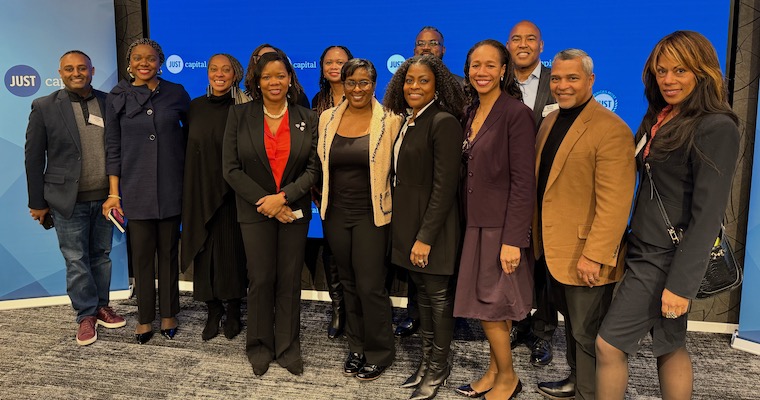
Black Corporate Board Readiness Program Addresses Impact of Supreme Court’s Affirmative Action Ruling
Since 2021, Leavey’s Black Corporate Board Readiness program at its Silicon Valley Executive Center has sought to accelerate diversity in corporate governance through a structured executive education program for Black leaders. In addition to assisting in placing its alumni into more than 115 corporate board seats in just three years, the program has continually provided a safe space for conversations about the realities and responsibilities of being a Black corporate leader.
As the nation celebrates Black History Month in 2024, that safe space is more important than ever. The recent Supreme Court decision to restrict colleges and universities from considering racial diversity in admissions upends historical efforts to provide equitable access to opportunities that improve economic standing. The ruling compels us to monitor the consequences throughout society, impacting the labor market at all skill levels and affecting employers of all sizes by altering the composition of their workforce’s leadership from general managers to the c-suite and the boards that govern them.
The Supreme Court decision has the potential to limit access of Black students to select higher education institutions and also affect the pipeline that leads to diverse corporate boards and leadership, according to Black Corporate Board Readiness alumna Anita Lynch, , and Leavey’s Dennis Lanham, executive director of the Silicon Valley Executive Center.
“If we as a society wish to maintain the American Dream, it is crucial to recognize that socio-economic mobility in the U.S. is tightly linked to educational opportunities, and removing access to those opportunities is fundamentally harmful,” notes Lynch. “Many leading Black professionals and board directors attribute their academic or career opportunities to affirmative action, either directly or indirectly. Though these professionals were fully qualified, affirmative action solved for the opportunity gap to allow deeper consideration for many who would not have been considered otherwise.”
According to Lynch and Lanham, the SCOTUS ruling will only serve to deepen the opportunity gap for underrepresented students and, as a result, diversity of college graduates will decline. To limit the impact of this widening gap, boards, recruiters, and HR managers will need to have more active roles in diversification within their businesses. Lynch and Lanham point out that the current criteria for corporate directorship are stringent, often requiring C-level experience. A significant emphasis is also placed on the reputation of one's educational institution. If corporations continue to recruit talent through this aperture without tools like affirmative action to help ensure access to “reputable” educational institutions, the pool of qualified Black talent may become smaller.
“Exposure to people from different economic, social, and cultural backgrounds has been proven to breed new ideas,” he says. “As the demographics of college graduates from elite institutions undoubtedly changes, students across the board will be less exposed to the diverse viewpoints that have historically driven innovation and creativity in the corporate world.”
Lynch and Lanham add that corporate directors also have a fiduciary duty to provide strategic oversight to make their company more competitive, and research shows that corporate boards, in particular, which are more diverse in experience and inclusive of different perspectives have superior business performance, better outcomes for stakeholders, and, ultimately, are more able to ensure the economy remains resilient.
The work of the Black Corporate Board Readiness program has proven that through the development of a network that showcases Black executives, diversification of corporate boards becomes more common. The program’s newly seated board members are bringing fresh perspectives to board practices and decisions which will influence corporate cultures, strategies and outcomes far into the future.
And, in light of the new challenges resulting from the Supreme Court’s ruling, there is more support than ever to ensure these types of programs continue to thrive. Rod Cotton, former senior vice president at Roche, recently made a $100,000 gift to the Barry Lawson Williams Black Corporate Board Readiness Endowment Fund with the goal of encouraging others like him to significant contributions in the coming years to promote the work of the program.
“Now is the time for leaders in the boardroom to take action to preserve the American Dream for qualified talent pools who simply lack the visibility for consideration,” says Cotton. “The important work of the Black Corporate Readiness Program will help keep the spotlight on corporate diversity, inclusivity, and equal access to opportunity.”
For Lynch and Lanham, the recent ruling means business will have to pivot and re-evaluate their corporate recruiting practices as smart, skilled, and capable Black talent may be graduating from universities outside a corporation’s typical recruiting ground. Those committed to the value diversity brings need to refine their hiring methodologies, from the schools they scout to the skills they prioritize.
“By limiting access of Black students to select higher education institutions, we are breaking the pipeline that leads to diverse corporate leadership and boards,” says Lynch. “If SCOTUS will not uphold affirmative action in favor of maintaining equal access to opportunity, corporations themselves must take up the fight.”
Considering SCOTUS’ decision, Lynch and Lanham believe corporations and initiatives like the Black Corporate Board Readiness program must take up the fight to maintain equal access to opportunity.